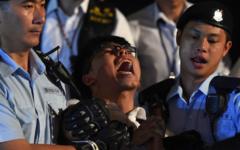A court in Hong Kong is poised to impose sentences on 45 activists involved in one of the city's largest national security cases, with some of the most recognized figures in the pro-democracy movement facing the repercussions of their actions. Joshua Wong, Benny Tai, and others were part of a group dubbed the Hong Kong 47, charged under the national security law (NSL) which critics view as a tool for suppressing dissent.
The legal troubles stem from a 2020 primary election aimed at consolidating opposition support ahead of the Legislative Council (LegCo) elections. This strategy attracted significant public participation, with more than half a million votes cast. Organizers intended for the primary to fortify the opposition's influence against the pro-Beijing government, particularly after months of protests in 2019. However, Hong Kong and Chinese officials claimed this initiative threatened the constitutional order under the recently enacted NSL.
Defendants in the case either confessed or faced conviction for attempting subversion; however, two were acquitted, leading to the anticipated sentences for the remaining 45 individuals. Among the high-profile defendants are longtime activists like Wong and Tai, both of whom have become central to the pro-democracy narrative in Hong Kong's political landscape.
Benny Tai, a law professor and one of the primary organizers of the 2020 primary, has been labeled by Chinese officials as a "hardcore troublemaker." He rose to prominence with the Occupy Central movement, advocating for democratic reforms, and has since faced multiple legal challenges under the NSL, including losing his academic position due to his activism.
Joshua Wong, perhaps the most recognizable name in the movement, began his activism at a young age, becoming a central figure during the Umbrella Movement in 2014. Despite various imprisonments, Wong has maintained a defiant stance, proclaiming that no amount of repression can stifle the quest for democracy in Hong Kong.
Other activists in the group, like Claudia Mo and Long Hair (Leung Kwok-hung), also represent a mix of political backgrounds and experiences. While Mo is a former journalist and lawmaker, Long Hair is known for his flamboyant protests, as both have faced incarceration for their roles in opposing government actions.
As the court prepares to issue sentences that could further sway the fate of democratic movements in Hong Kong, activists await their judgment amid a backdrop of increasing tension, governmental repression, and international scrutiny regarding the preservation of human rights in the region. The outcome on Tuesday is likely to resonate well beyond Hong Kong, raising essential questions about the balance between national security and the right to dissent.




















